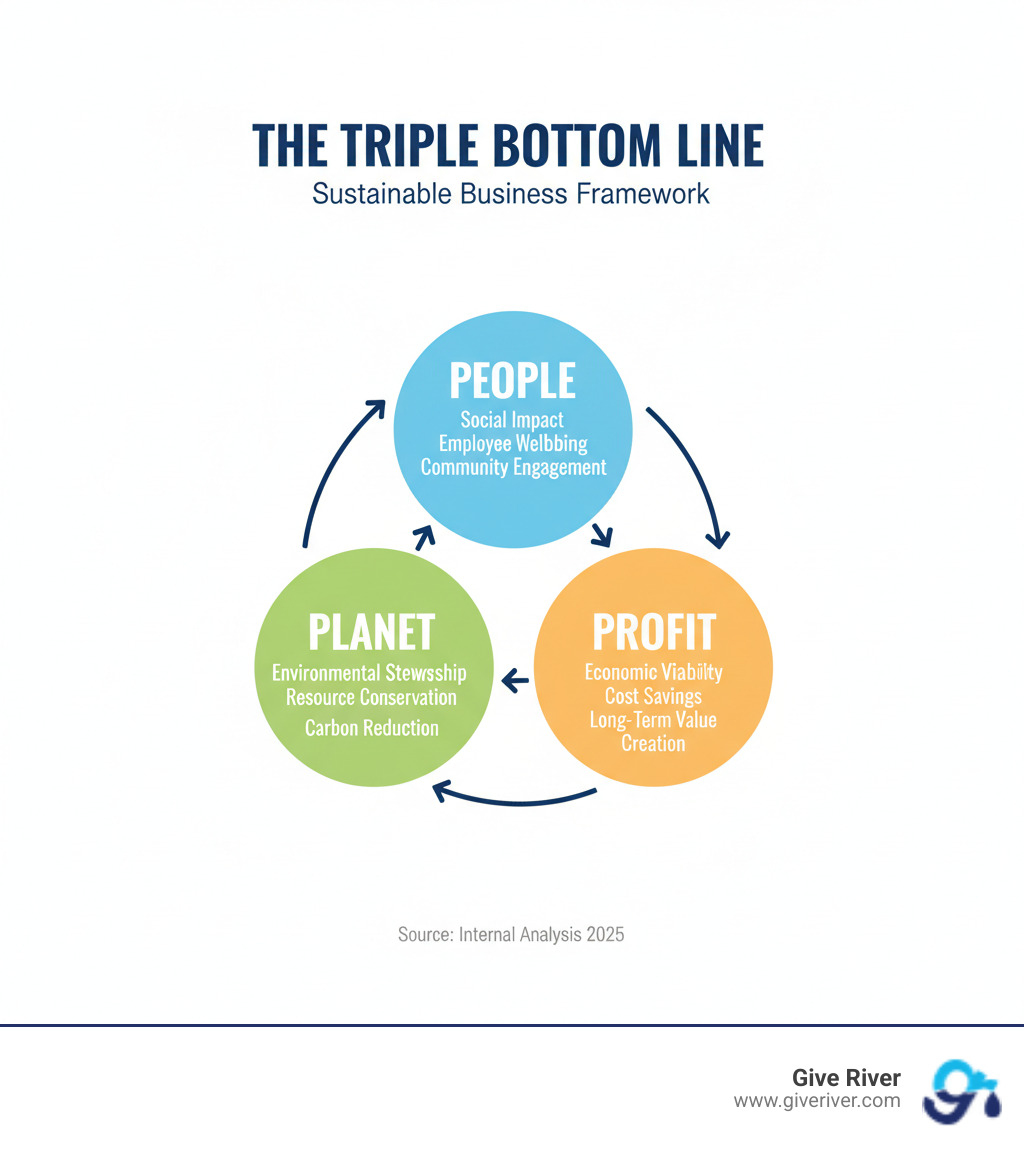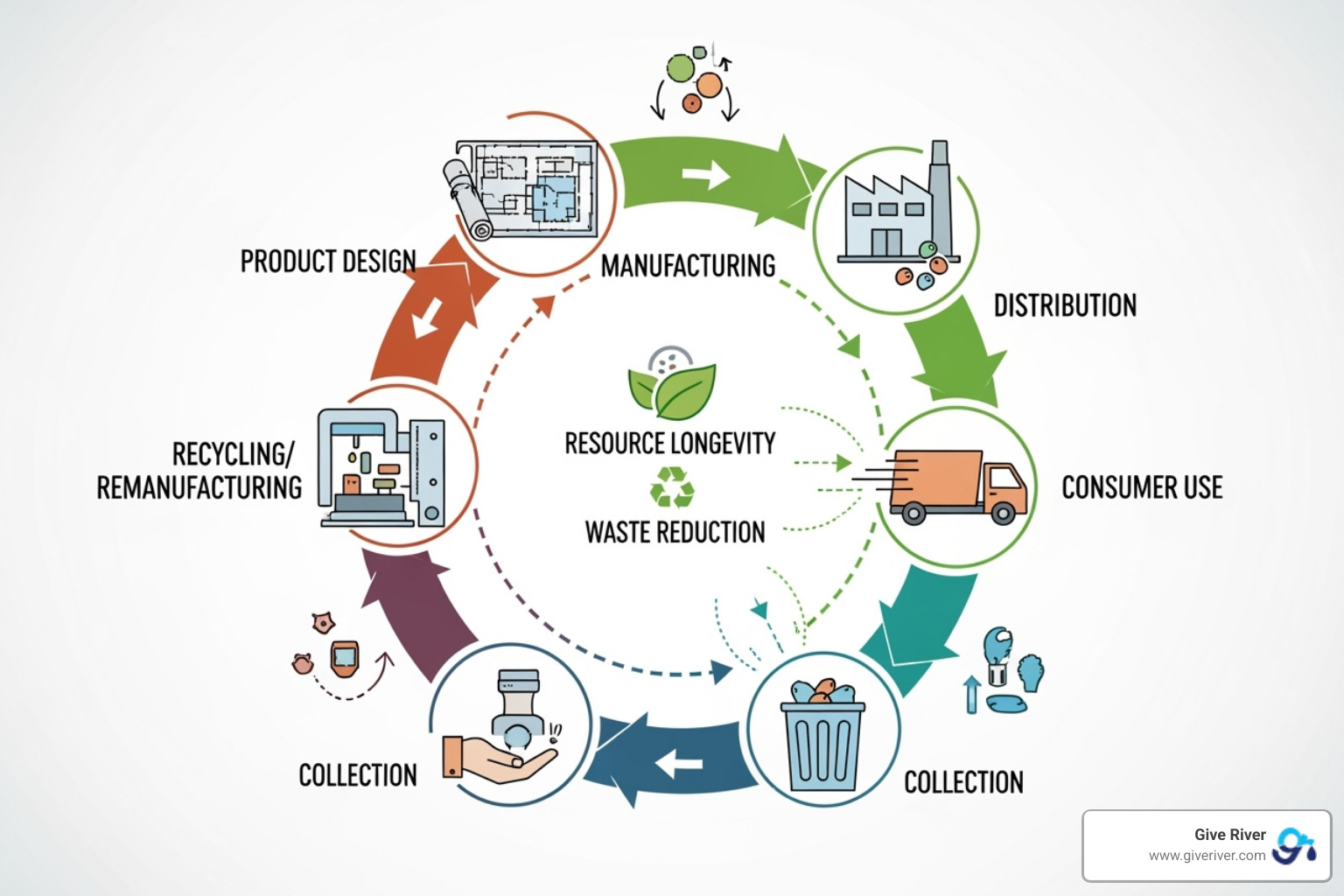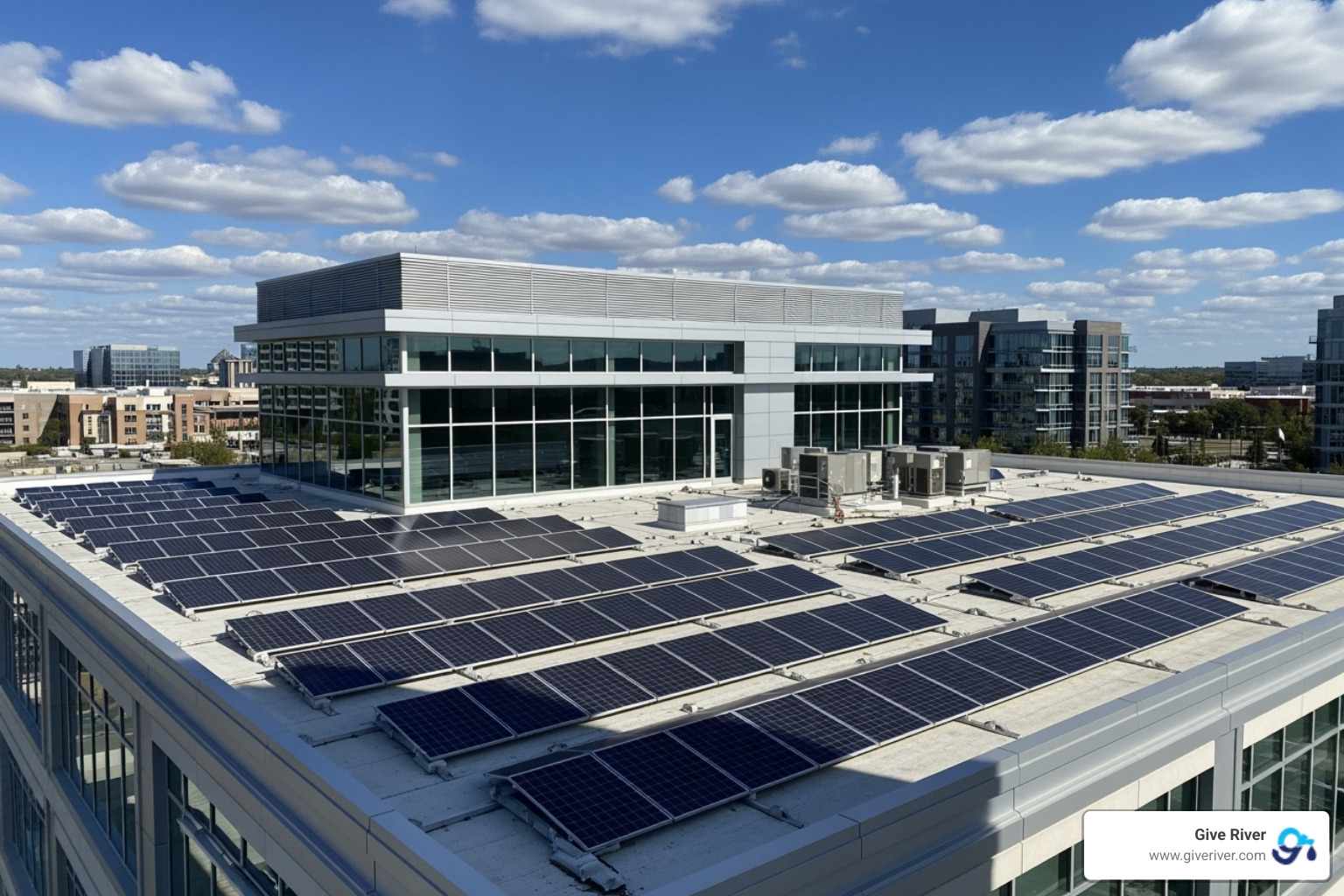The Planet-Positive Playbook: Mastering Sustainable Business Practices
Master sustainable business practices to boost your business, people, and planet. Implement your green playbook today.

Beyond "Going Green": The Strategic Advantage of Sustainable Business Practices
Sustainable business practices are no longer a niche concern but a core strategic advantage. These comprehensive approaches balance economic viability, social responsibility, and environmental stewardship to create long-term value for all stakeholders. The benefits range from improved brand reputation and talent retention to increased investor appeal.
The numbers speak for themselves. With investment in ESG assets projected to hit $53 trillion by 2025, 71% of job seekers preferring sustainable employers, and 80% of consumers prioritizing sustainability, the message is clear. This isn't just about doing good—it's about doing well. Sustainable practices deliver measurable returns through cost savings, brand loyalty, and access to capital.
While some still see sustainability as an expense, it has evolved into a framework for building resilient, profitable, and purpose-driven organizations. I'm Meghan Calhoun, co-founder of Give River, and I've seen how these practices drive success. Our platform uses gamification and charitable impact to help teams implement sustainability initiatives. Unlike peer-recognition platforms like Bonusly or Kudos, we connect these efforts to measurable charitable impact, fostering positive change and a stronger workplace culture.

The Strategic Blueprint for Sustainable Business Practices
The business world has undergone a fundamental shift. Where once companies focused solely on maximizing profits, today's most successful organizations recognize that true prosperity comes from balancing people, planet, and profit—what we call the triple bottom line. This isn't just idealistic thinking; it's smart business strategy that's reshaping entire industries.
Why Sustainability is a Business Imperative, Not Just a Buzzword
A truly sustainable business is economically viable while actively improving its social impact and protecting the environment. This concept isn't new; it builds on decades of work, including the landmark 1987 Brundtland Commission report that defined sustainable development as meeting the needs of the present without compromising the ability of future generations to meet their own needs.
What began as an ethical responsibility has become a financial imperative. Sustainability delivers clear bottom-line results by attracting talent, customers, and investors. Companies see cost reductions from improved efficiency, build resilience against risk, and drive innovation by developing new, sustainable products and services. The advantages of corporate social responsibility are no longer just about compliance—they are engines of growth.
How to Develop and Implement a Successful Sustainability Strategy
Avoid "random acts of sustainability" by building a coherent strategy. Here’s how:
- Start with an Assessment: Understand your current environmental, social, and governance (ESG) baseline. You can't improve what you don't measure.
- Set SMART Goals: Move from vague commitments to specific, measurable, achievable, relevant, and time-bound targets, like "achieve carbon neutrality by 2030."
- Secure Leadership Commitment: True change requires genuine executive support to open up resources and drive cultural shifts.
- Engage Employees: Your team is your greatest asset. Platforms like Give River harness their ideas through gamification and recognition, offering a deeper focus on charitable impact than peer-recognition tools like Bonusly or Kudos.
- Track and Report Progress: Use KPIs and corporate social responsibility reporting to maintain transparency and guide your strategy. Our data-driven insights can help you focus your efforts.
Overcome common challenges like initial costs and organizational inertia by focusing on quick wins that demonstrate value and build momentum.
Five Key Focus Areas for Impactful Sustainable Business Practices
Focus your efforts where you can make the greatest impact. Here are five key areas:
- Climate Risk Management and ESG Reporting: Systematically assess climate-related financial risks and use robust ESG reporting to provide transparency to stakeholders and track progress.
- Resilient Infrastructure and Intelligent Operations: Design systems that perform better with fewer resources, using smart technologies to optimize energy, extend equipment life, and eliminate waste.
- Sustainable Supply Chains and Circular Economy: Partner with responsible suppliers and design products for reuse and recycling to minimize your footprint across the entire value chain.

- Energy Efficiency and Decarbonization: Implement renewable energy, electrify operations, or upgrade systems to achieve immediate cost savings and reduce your environmental impact.
- Integrated Sustainability Strategy: Embed sustainability into all business functions—from product development to financial planning—to ensure it's part of how you operate, not an afterthought. Explore practical CSR environmental sustainability initiatives for inspiration.
Activating Your Sustainability Playbook: From Strategy to Action
The most brilliant sustainability strategy in the world means nothing if it stays locked in a boardroom presentation. Real change happens when we roll up our sleeves and put those plans into action—and that change starts with the people who show up to work every day.
Engaging Your Team: The Heart of Sustainable Business Practices
Your employees are the engine of your sustainability efforts. When they understand the "why" and feel empowered, they transform initiatives into meaningful purpose. Here’s how to engage them:
- Educate and Inspire: Go beyond compliance training. Share stories that connect daily work to real-world impact, like how waste reduction protects local waterways.
- Promote Volunteerism: Organize company-wide clean-ups or offer paid time off for environmental volunteering. These shared community involvement programs build strong teams.
- Form Green Teams: Empower passionate employees to lead change from within, identifying opportunities and translating goals into department-level action.
This approach builds a purpose-driven culture that improves employee engagement and retention. At Give River, we facilitate this by connecting recognition to charitable impact and gamified challenges. While platforms like Bonusly and Kudos are great for peer recognition, our focus on measurable impact creates a deeper sense of fulfillment.
Impactful Examples of Sustainable Business Practices to Adopt Now
Ready to take action? Small, strategic changes can have a big impact. Consider these practices:
- Waste Reduction: Implement comprehensive recycling and composting, and look for ways to eliminate waste at the source in your production processes.
- Renewable Energy: Transition to renewable sources by installing solar panels or purchasing green energy. This often leads to cost savings and predictable energy prices.
- Sustainable Sourcing: Choose suppliers who practice fair labor and responsible material sourcing to extend your impact beyond your own walls.
- Green Building Certification: Use programs like LEED for new builds or renovations to create healthier, more efficient workspaces.
- Eco-Friendly Product Design: Design products for durability, repairability, and recyclability to create long-term value and reduce environmental impact.
- Nonprofit Partnerships: Amplify your efforts and gain expertise by collaborating with nonprofits on charitable impact strategies.

These CSR initiatives examples are most effective when employees are engaged. The Give River platform makes these efforts visible and rewarding through gamified challenges, focusing on the measurable community impact that proves to your team their efforts matter.
The Future is Green: Technology, Data, and Continuous Improvement
The future of sustainability is about working smarter, using technology to turn good intentions into a data-driven competitive advantage.
- AI and IoT: Smart sensors and AI can optimize energy use, streamline logistics, and reduce waste by analyzing real-time data.
- Blockchain: This technology provides an unbreakable, transparent record of supply chains, building trust and combating greenwashing.
- Data-Driven Decisions: Use predictive analytics and robust data to track progress with the same precision as financial metrics, enabling continuous improvement and integrating with tools like HR data reporting.
This data-centric approach fosters an innovation mindset. To maintain momentum, engagement must be rewarding. Our platform uses gamification to transform sustainability goals into collaborative challenges, turning commitments into engaging experiences that drive measurable impact.

The companies that thrive will be those that see sustainability as a driver of innovation, efficiency, and fulfillment. The future is green, and it's arriving quickly.
Conclusion: Building a Planet-Positive Legacy
The conclusion is clear: sustainable business practices are not just the right thing to do; they are the smart thing to do. They form the foundation for resilient, profitable, and purpose-driven organizations, delivering improved brand reputation, talent attraction, investor appeal, and cost savings.
The difference between talking about sustainability and truly living it comes down to your people. Engaged, empowered employees are your greatest sustainability asset, turning goals into tangible impact.
At Give River, we help open up this potential. Our platform goes beyond what traditional recognition tools like Bonusly or Kudos offer by connecting employee recognition to measurable community impact. We know today's employees seek fulfillment, not just engagement. By linking daily efforts to charitable impact strategies, sustainability becomes personal and meaningful.
Your planet-positive legacy starts with empowering your team. Through gamification, recognition, and genuine community impact, we can help you build a culture that attracts top talent, delights customers, and creates lasting positive change.
Ready to transform your workplace into a force for good?
Explore our charitable impact solutions today and start building a more sustainable future with your team. When your people thrive, your planet and business thrive too.




